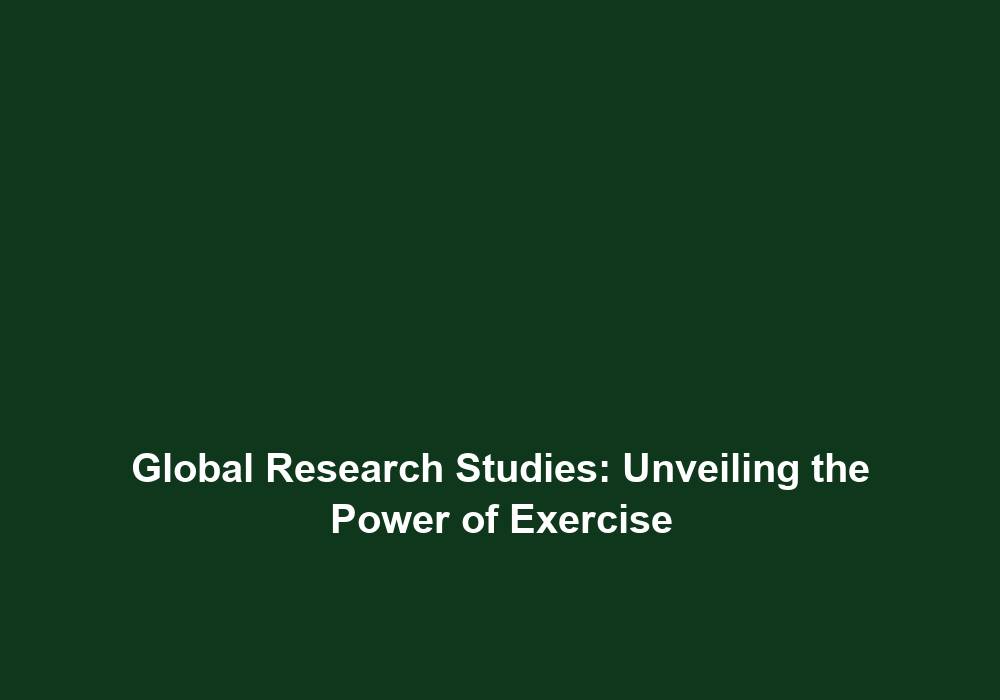Global Research Studies: Unveiling the Power of Exercise
Exercise has long been recognized as a key component of a healthy lifestyle. Not only does it help in weight management and physical fitness, but it also plays a significant role in improving mental well-being. In recent years, global research studies have further highlighted the remarkable power of exercise, revealing its impact on various aspects of human health. This article will delve into some of the key findings from these studies, shedding light on the immense benefits that exercise can bring to individuals worldwide.
Physical Health Benefits
Weight Management and Metabolism
One of the most apparent benefits of exercise is its ability to assist in weight management. Regular physical activity helps burn calories and increases metabolism, making it easier to maintain a healthy weight. Global research studies have demonstrated that engaging in aerobic exercise, such as walking, jogging, or cycling, can aid in reducing body fat and controlling body mass index (BMI).
Exercise not only helps with weight management but also promotes a healthy metabolism. When we exercise, our body’s metabolic rate increases, allowing us to burn more calories throughout the day, even when we are at rest. This is particularly beneficial for individuals looking to lose weight or maintain a healthy weight. By incorporating regular exercise into our routine, we can effectively manage our weight and improve overall body composition.
Furthermore, engaging in aerobic exercises, such as running or swimming, can help boost the body’s metabolic rate even more. These activities increase heart rate and oxygen consumption, leading to greater calorie burning. Additionally, strength training exercises, such as weightlifting, can help build lean muscle mass, which further contributes to a higher metabolic rate. By combining both aerobic and strength training exercises, individuals can maximize their weight management efforts and achieve optimal results.
Cardiovascular Health
Exercise also plays a pivotal role in maintaining a healthy heart and reducing the risk of cardiovascular diseases. Regular physical activity strengthens the heart muscles, improves blood circulation, and lowers blood pressure. Studies have shown that individuals who engage in regular exercise have a lower risk of developing heart conditions like coronary artery disease, stroke, and heart attacks.
Engaging in cardiovascular exercises, such as brisk walking, jogging, or cycling, helps improve the efficiency of the heart. During exercise, the heart pumps more blood, leading to increased blood flow to the muscles and organs. This increased blood flow strengthens the heart muscles and improves its ability to pump blood effectively, reducing the workload on the heart.
Furthermore, exercise helps to lower blood pressure, a significant risk factor for cardiovascular diseases. When we exercise, the blood vessels expand, allowing for better blood flow and lower resistance. This, in turn, helps to reduce blood pressure levels. By incorporating regular exercise into our routine, we can significantly reduce the risk of developing heart conditions and maintain a healthy cardiovascular system.
Bone Health
Global research studies have revealed that exercise is crucial for maintaining strong and healthy bones. Weight-bearing exercises, such as walking or weightlifting, promote bone density and reduce the risk of osteoporosis. By engaging in such activities, individuals can decrease the likelihood of fractures and improve overall bone health.
Regular exercise, particularly weight-bearing exercises, helps stimulate the production of new bone tissue, leading to increased bone density. This is especially important as we age, as bone loss becomes more prevalent. By incorporating weightlifting, resistance training, or activities that involve impact, such as jumping or dancing, individuals can enhance their bone strength and reduce the risk of fractures.
Additionally, exercise also helps improve balance and coordination, further reducing the risk of falls and related injuries. By engaging in exercises that challenge balance, such as yoga or tai chi, individuals can strengthen their muscles and improve overall stability, contributing to better bone health in the long run.
Immune System Boost
Exercise is known to have a positive impact on the immune system, helping to strengthen the body’s defense against infections and diseases. Global research studies have shown that regular physical activity can enhance the production of antibodies and white blood cells, which are vital components of the immune system. By boosting the immune system, exercise reduces the risk of illnesses and promotes overall well-being.
Regular exercise has been found to increase the circulation of immune cells in the body, allowing them to travel more efficiently and effectively to combat potential threats. This enhanced circulation helps to detect and eliminate harmful pathogens, reducing the likelihood of infections and diseases.
Furthermore, exercise also decreases the levels of stress hormones in the body, such as cortisol, which can have a suppressive effect on the immune system. By reducing stress levels through exercise, individuals can create a more conducive environment for their immune system to function optimally.
Mental Health Benefits
Stress Reduction
In today’s fast-paced and demanding world, stress has become a significant concern for many individuals. Exercise has proven to be an effective tool in managing and reducing stress levels. Engaging in physical activity releases endorphins, also known as feel-good hormones, which can alleviate anxiety and enhance mood. Global research studies have consistently demonstrated that exercise is an excellent stress-reliever, helping individuals relax and improve their mental well-being.
Exercise is a natural stress reliever, as it helps to reduce the levels of stress hormones in the body and release endorphins, which are natural mood boosters. When we exercise, our body produces endorphins, which interact with receptors in the brain, reducing pain perception and promoting a sense of well-being.
Furthermore, exercise provides an opportunity for individuals to focus their attention on the present moment, diverting their thoughts from stressors and promoting relaxation. Activities such as yoga or tai chi, which combine physical movement with deep breathing and mindfulness, can be particularly effective in reducing stress levels and promoting a calm state of mind.
Mood Enhancement
Beyond stress reduction, exercise has a profound impact on improving overall mood and mental state. Research has shown that regular physical activity stimulates the release of neurotransmitters like serotonin, dopamine, and endorphins, which contribute to feelings of happiness and relaxation. Consequently, individuals who exercise regularly report reduced symptoms of depression and anxiety.
Serotonin, often referred to as the “feel-good” neurotransmitter, plays a crucial role in regulating mood and emotions. Exercise has been shown to increase serotonin levels in the brain, leading to improved mood and a greater sense of well-being.
Exercise also stimulates the release of dopamine, another neurotransmitter associated with pleasure and reward. By engaging in regular exercise, individuals can experience an increase in dopamine levels, promoting feelings of motivation, satisfaction, and overall happiness.
Additionally, exercise can provide a sense of accomplishment and self-confidence, as individuals set and achieve fitness goals. This increased self-esteem can have a positive impact on mental health and overall well-being.
Cognitive Function
The power of exercise extends to cognitive function as well. Numerous global research studies have unraveled the positive effects of physical activity on cognitive abilities such as memory, attention, and problem-solving skills. Regular exercise increases blood flow to the brain, providing it with more oxygen and nutrients, thereby enhancing cognitive performance and reducing the risk of age-related cognitive decline.
Exercise has been found to have a significant impact on brain health and cognitive function. When we exercise, blood flow to the brain increases, delivering essential nutrients and oxygen that support optimal brain function. This increased blood flow promotes the growth of new blood vessels and brain cells, contributing to improved cognitive abilities.
Furthermore, exercise also stimulates the release of substances called growth factors, which are involved in the growth, development, and maintenance of brain cells. These growth factors help protect existing brain cells and promote the formation of new connections, enhancing memory, attention, and overall cognitive function.
Regular exercise has also been linked to a reduced risk of age-related cognitive decline and neurodegenerative diseases such as Alzheimer’s disease. By incorporating exercise into our daily lives, we can support brain health and maintain cognitive abilities as we age.
Sleep Quality
Quality sleep is essential for physical and mental well-being, and exercise plays a significant role in improving sleep patterns. Engaging in regular physical activity helps regulate the sleep-wake cycle, promoting better sleep quality. Global research studies have indicated that individuals who exercise consistently experience deeper and more restorative sleep, leading to increased energy levels and improved overall productivity.
Exercise has been shown to have a positive impact on sleep quality and duration. Regular physical activity helps to regulate the body’s circadian rhythm, the internal clock that controls our sleep-wake cycle. By establishing a consistent exercise routine, individuals can synchronize their circadian rhythm, promoting a more regular sleep pattern.
Additionally, exercise helps to reduce anxiety and stress levels, which are common contributors to sleep disturbances. By engaging in physical activity, individuals can alleviate these factors and create a more conducive environment for quality sleep.
Furthermore, exercise has been found to increase the production of adenosine, a chemical compound that promotes sleep. Adenosine builds up in the brain throughout the day and is gradually broken down during sleep, contributing to a restful night’s sleep.
Incorporating Exercise into Daily Life
Now that we understand the multitude of benefits that exercise offers, it is important to explore ways to incorporate it into our daily lives. Here are some practical tips:
-
Start with small steps: Begin by incorporating short bursts of physical activity into your daily routine, such as taking the stairs instead of the elevator or going for a brisk walk during lunch breaks.
-
Find activities you enjoy: Engaging in activities that you genuinely enjoy will increase the likelihood of sticking to an exercise routine. Whether it’s dancing, swimming, or playing a sport, choose activities that bring you joy and make exercise an enjoyable part of your life.
-
Set realistic goals: Establish achievable goals that align with your fitness level and schedule. Gradually increase the intensity and duration of your workouts as you progress, ensuring a sustainable and long-term commitment to exercise.
-
Mix it up: Incorporate a variety of exercises to keep your routine interesting and prevent boredom. Combining cardiovascular activities, strength training, and flexibility exercises will provide a well-rounded approach to fitness.
-
Seek professional guidance: Consult with a fitness professional or personal trainer to tailor an exercise program that suits your specific needs and goals. Their expertise will ensure a safe and effective workout routine.
By following these tips, individuals can successfully incorporate exercise into their daily lives and reap the numerous benefits it offers.
Conclusion
The global research studies conducted on the power of exercise have brought to light its incredible benefits for both physical and mental health. From weight management and cardiovascular health to stress reduction and cognitive function improvement, exercise has truly proven to be a transformative tool. By incorporating exercise into our daily lives, we can unlock its potential and embrace a healthier, happier, and more fulfilling lifestyle. So, lace up your sneakers, find an activity you love, and allow exercise to empower you on your journey towards optimal well-being.







